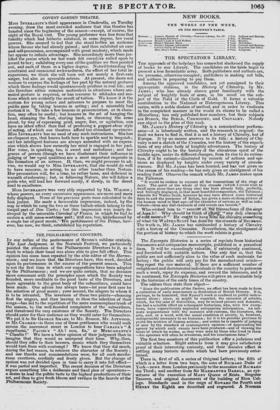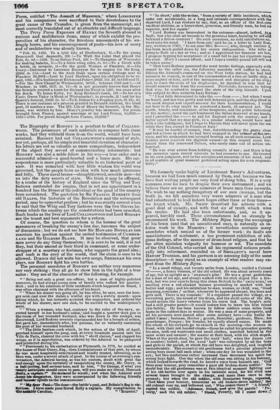• The Exempla Historica is a series of reprints from
historical documents and antiquarian manuscripts, published in a periodical -form. It will be exceedingly valuable, if extensively, continued, and furnished with suitable indices. Onr,only fear is, that the public are not sufficiently alive to the value of such materials for history : the public will only pay for the. Manufactured article— they reject the raw material. If there are a sufficient number of enlightened and disinterested individuals in the country.to patronize such a work, repay its expense; and reward the labourers, and it be continued, the Excerpta Historica will prove an invaluable help to the historian of the early times of the country.
, The editors thus state their object- " Since the publication of the Reilera, no effort has been made to form a collection of early muniments in illustration of British History. It is, perhaps, to be lamented, that Rymer's work is confined to public instru- ments alone ; since, as might be expected, the omission of articles; which, for the sake of distinction, may be termed private and domestic, has had a sensible effect on subsequent historians, who, with few excep- tions, have superciliously neglected antiquarian information. An inti- mate acquaintance with the manners and customs, the literature, the arts, and, in a word, with the moral condition of society, iS, however, indispensably necessary to an historian ; for it is his peculiar province to probe the motives of human actions; and unless he is capable of judging of men .by the standard of contemporary opinion—of appreciating the agency by. Which. such events have been produced—and of viewing the times of which:he writes, as they were seen by those who lived in them —his opinions will often be erroneous, and his conclusions false."
The first two numbers of this publication offer a judicious and valuable selection. Slight extracts from it may give satisfactory proof of their interesting curiosity, and their decisive effect in settling many historic doubts which had been previously enter- tained.
There is, first of all, a series of Original Letters"; the fifth of which is a letter from two boys, the sons of Ricaaan Duke of :York—news. from London previously to the accession of RICHARD the Third ;. and another from Sir MARMADUKE DARELL, an eye- witness of the execution of MARY Queen. of .fients. Singular Tenures, and original documents of the building of Eton Col- lee. , Standards- used` in the reign of EDWARD the Fourth and HENRY the, Eighth are deScribecl and engraved. A Malian Poem, entitled "The Assault of Isicassoura," where LONGESPEE and his companions were sacrificed to their devotedness to the great cause of the Crusades, is given from the manuscript, anl most correctly translated out of an obsolete and difficult language. The Privy Purse Expenses of HENRY the Seventh abound in Curious and multifarious items, many of which exhibit the pro- pensities of his character, the frivolous amusements of his an- kingly hours, and his encouragement of poets—his love of usury ani of architecture was already known.
"Feb. 10, 1492. To a lytel felo of Shaftesbury, IL—To the young Demoysell that daunceth, 301. !—To Watt the Luter that played the Fole, 6s. 8d.-1496. To an Italian Poet, 20/. 1—To Hampton of Worcester for making balades, 11.—To a felow eting cotes, 6s. 8d.—To a Greek with a berde, in rewarde, 1/.—To the grete Woman of Flanders, 21.—His Usury—Delivered to Laurence Bonavyse for to employ for the King, 2068/. 4s. 1 Id.—Lent to the Arch Duke upon certain writings sent to Flanders 30,0001.—Lent to Lord Herbert, upon his obligation to be re- paid, 1601.—His buildings at Richmond Palace,4803/. 16s. 3d. inI496 and 97. —For the New Chapel at Westminster, 9650/., between 1503 and 5.—At Windsor, in 1496, 667/. 2s. 7d.—It is not generally known that Henry the Seventh erected a tomb for Richard the Third in 1495, ten years after his death. To James Kyley, for King Richard's tomb, 101—To his own Uncle, Owen Tudor (a Monk at Westminster), in rewarde, 21.! and for his Queen's funeral, 2389/. Os. Id —To R.Dekon for a Popping-jaye, 61.13s. 4d. There is one instance of a pension granted to Bernard Andreas, tae blind poet, 10 markes a year. The MS. Life of Henry the Seventh, in the Mu- seum, was written by him. Henry's jewelry was immense. For jewels brought from France, against marriage of my Lord Prince, 14,0001.- 3501-1504. For jewels brought from France, 30,000/."























 Previous page
Previous page